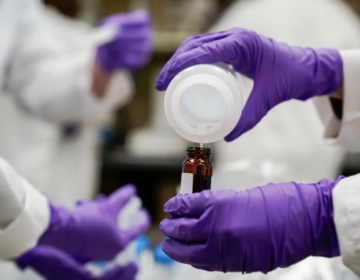N.J. company kept details on new ‘forever chemicals’ hidden for years, advocacy group tells EPA
A new filing alleges South Jersey firm Solvay knew chemicals were toxic but withheld that information.

Solvay Specialty Polymers said it is using unnamed “process aids” at its West Deptford facility as a substitute for PFNA. (Delaware Riverkeeper Network)
This story originally appeared on NJ Spotlight.
___
A South Jersey chemical company knew that a group of its “forever chemicals” was damaging to human health but hid that from federal regulators for at least six years, according to a petition filed by an advocacy group to the U.S. Environmental Protection Agency.
Environmental Working Group, a national nonprofit, said Solvay Specialty Polymers of Gloucester County violated the federal Toxic Substances Control Act by failing to report its finding that the chemicals posed a substantial risk to human health or the environment as soon as it got the test results in June 2005.
It took the company until March of 2011 to tell the EPA that its tests on rats using the CIPFPECA class of chemicals had found a “substantial” risk of injury to humans, the advocacy group said in its petition, filed on Tuesday.
The company also knew in 2011 that the chemicals accumulate in human blood but did not disclose that to the EPA until 2019, the petition said.
“Solvay’s extreme delay in filing the required … report interfered with the EPA’s ability to address situations involving unreasonable risks and substantially endangered health and the environment,” EWG said.
The group urged the EPA to fine Solvay more than $400,000 for the alleged violations of the toxic substances law. The EPA said it would have no immediate comment.
Solvay denies the allegation
Solvay denied it violated the toxic substances law. “Solvay adheres to high standards and disclosure requirements in all locations in which we operate. We believe these allegations are misguided and without merit,” it said in a statement responding to the petition.
The company disclosed in October last year that it has been using the unregulated replacement chemicals instead of PFNA (perfluorononanoic acid), a toxic chemical that it phased out of use in 2010, and which has been regulated by New Jersey since 2018. PFNA was found in public water at Paulsboro, near Solvay’s West Deptford plant, in 2013, causing the shutdown of one well until filters were fitted, and prompting state officials to urge residents to use bottled water for young children.
Environmental groups and state regulators have frequently accused the company of being responsible for contaminating water and soil with PFAS chemicals near its plant. In November, New Jersey’s Department of Environmental Protection sued Solvay in a Natural Resource Damage suit, saying that its use of both the old and new PFAS chemicals was a risk to human health and the environment. In 2019, the DEP filed a “directive” against Solvay and four other chemical companies, accusing them of contaminating the environment with PFAS chemicals, and failing to clean them up.
Scientists and regulators have warned for years that the new CIPFPECA chemicals may be just as dangerous to human health as the chemicals they are designed to replace. But the replacements are not subject to the strict new health limits that have been imposed on some of the older chemicals by New Jersey and other states. Critics say that regulating the chemicals one by one is akin to whack-a-mole because industry develops new substitutes as soon as the older chemicals are regulated, and so PFAS should be regulated as a class.
Both the old and new chemicals are part of the PFAS (per- and polyfluororalkyl substances) family, which are known as forever chemicals because they don’t break down in the environment and accumulate in the human body. Their health effects include some cancers, immune-system impairments, and developmental problems in young children, and they are believed to be widespread in the population. The chemicals were once used in consumer products including Teflon, and are still used in some products including food packaging.
The new CIPFPECA chemicals — formally known as chloroperfluoropolyether carboxylate compounds — have already been found near Solvay’s plant, EWG said in its petition. “Studies by EPA researchers have identified these … compounds, previously unknown to the public, in soil and drinking water in close proximity to the Solvay facility in New Jersey,” the document said.
Lack of timely notification?
“If Solvay had timely notified the EPA that these compounds posed a ‘substantial risk,’ the EPA may have been able to take action to restrict usage, prevent these environmental releases, and mitigate the contamination,” it said.
It noted that Solvay had already agreed with EPA to phase out its use of PFNA and other older PFAS chemicals by the time it finalized its lab report for the replacement chemicals in 2006, and so was “well aware” that EPA would want to know about similarly toxic chemicals.
Solvay apparently participated in the phase-out program “while withholding pertinent safety and bioaccumulation data on their particular replacement chemical from the agency for six years, thus undermining the goals of the program,” the petition said.
It said the extent of contamination and the potential harm to public health from the new PFAS chemicals is unknown but the EPA should be given all the relevant toxicity data so that it can assess the health risks.
Tracy Carluccio, deputy director of the environmental group Delaware Riverkeeper Network, and a longtime campaigner for regulation of PFAS chemicals, said Solvay’s alleged withholding of toxicology information shows that the company has violated the public trust.
“Solvay has tried over the years to portray themselves as ‘good neighbors’ but all along they had hid from the people living closest to them the truth about what they were using and emitting from the West Deptford facility, threatening the public’s health and betraying their trust,” she said.
WHYY is your source for fact-based, in-depth journalism and information. As a nonprofit organization, we rely on financial support from readers like you. Please give today.






